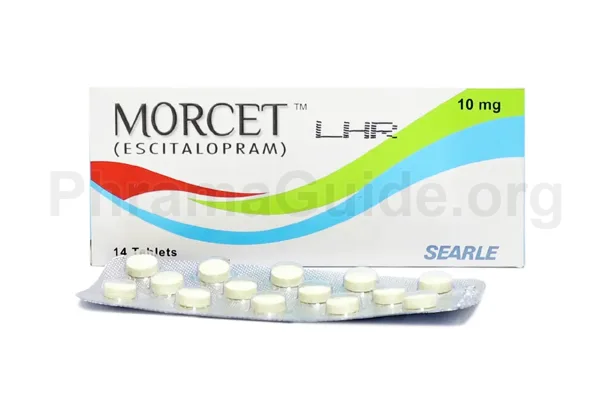Morcet is a commonly prescribed antidepressant belonging to the class of selective serotonin reuptake inhibitors (SSRIs). While Morcet is generally well-tolerated, some individuals may experience common to moderate and less common side effects. Here are some common and less common side effects of Morcet might include.
Common Side Effects
- Nausea: This is one of the most frequently reported side effects when starting Morcet, but it often improves over time.
- Headache: Some individuals might experience headaches, which can range from mild discomfort to more severe pain.
- Drowsiness or fatigue: Feeling tired or drowsy, especially at the beginning of treatment, is common. It might affect energy levels and concentration.
- Insomnia or changes in sleep patterns: Conversely, some individuals might experience difficulty falling asleep or changes in sleep patterns, such as increased sleepiness or vivid dreams.
- Sexual side effects: These might include reduced sexual desire (libido), difficulty achieving orgasm, or erectile dysfunction in men.
- Dry mouth: Some people may experience a dry sensation in the mouth.
- Increased sweating: Sweating more than usual, especially at night, can occur.
- Weight changes: Both weight loss and weight gain have been reported as side effects, but the impact varies from person to person.
- Gastrointestinal issues: Some individuals might experience diarrhea or constipation.
- Anxiety or agitation: In some cases, Morcet might cause feelings of restlessness or increased anxiety, especially during the initial phase of treatment.
- Dizziness: Feeling dizzy or lightheaded might occur, particularly when standing up quickly.
Less Common Side Effects
- Tremors or shaking: Some people may notice involuntary shaking or trembling, especially in the hands.
- Vision changes: Blurred vision or other changes in vision perception could occur.
- Abnormal bleeding: Morcet can affect platelet function, leading to an increased risk of bleeding or bruising in some individuals.
- Hyponatremia: This is a condition characterized by low sodium levels in the blood, which can lead to symptoms such as headache, confusion, weakness, or in severe cases, seizures.
- Mania or hypomania: In rare cases, Morcet can trigger manic or hypomanic episodes, especially in individuals with a history of bipolar disorder.
- Allergic reactions: While uncommon, allergic reactions to Morcet might manifest as rash, itching, swelling, dizziness, or difficulty breathing.
- Liver problems: In very rare instances, Morcet might lead to abnormal liver function tests or liver damage.
- Serotonin syndrome: Although rare, combining Morcet with other medications that increase serotonin levels can lead to serotonin syndrome, a potentially life-threatening condition characterized by rapid changes in mental status, blood pressure, and heart rate.
- Electrolyte imbalances: Rarely, Morcet can cause changes in electrolyte levels, leading to symptoms such as weakness, confusion, irregular heartbeat, or muscle cramps.
- Suicidal thoughts or behavior: While the medication is intended to treat depression and anxiety, in some cases, especially at the start of treatment or in young adults, Morcet might lead to increased thoughts of self-harm or suicidal tendencies.

What is Morcet?
Morcet is one of the leading brands of Escitalopram, manufactured and marketed by Searle (Pakistan) Ltd.
Morcet : Available Formulations and Strengths
Presently, Morcet is available in Tablet Form with the following strengths.
Morcet Tablet : 10mg strength.
What Are The Possible Drug Interactions of Morcet?
- MAO inhibitors (MAOIs): Taking Morcet with MAOIs or within 14 days of discontinuing MAOIs can lead to a potentially life-threatening condition called serotonin syndrome, characterized by symptoms like confusion, high fever, sweating, irregular heartbeat, and even seizures.
- Other antidepressants and psychiatric medications: Combining Morcet with other SSRIs, SNRIs (serotonin-norepinephrine reuptake inhibitors), tricyclic antidepressants, or certain antipsychotics may increase the risk of serotonin syndrome or other adverse effects.
- Blood thinners: Morcet might interact with blood thinners such as warfarin, increasing the risk of bleeding complications.
- NSAIDs and aspirin: Taking Morcet with nonsteroidal anti-inflammatory drugs (NSAIDs) or aspirin may increase the risk of bleeding, especially in the gastrointestinal tract.
- Triptans: Combining Morcet with migraine medications like triptans may increase the risk of serotonin syndrome or other side effects.
- Certain antibiotics and antifungals: Some antibiotics (like linezolid) and antifungal medications might interact with Morcet, potentially leading to serotonin syndrome or other adverse reactions.
- St. John’s Wort: This herbal supplement, used for depression, might interact with Morcet, leading to increased serotonin levels and potentially causing serotonin syndrome.
- Cimetidine: This medication used to treat ulcers and reflux might increase Morcet levels in the blood, potentially leading to side effects.
- Certain heart medications: Combining Morcet with medications like beta-blockers, antiarrhythmics, or other drugs affecting heart rhythm might increase the risk of irregular heartbeats or other cardiac issues.
- Alcohol: Drinking alcohol while taking Morcet can increase drowsiness or dizziness and impair judgment and coordination.

Leave A Comment